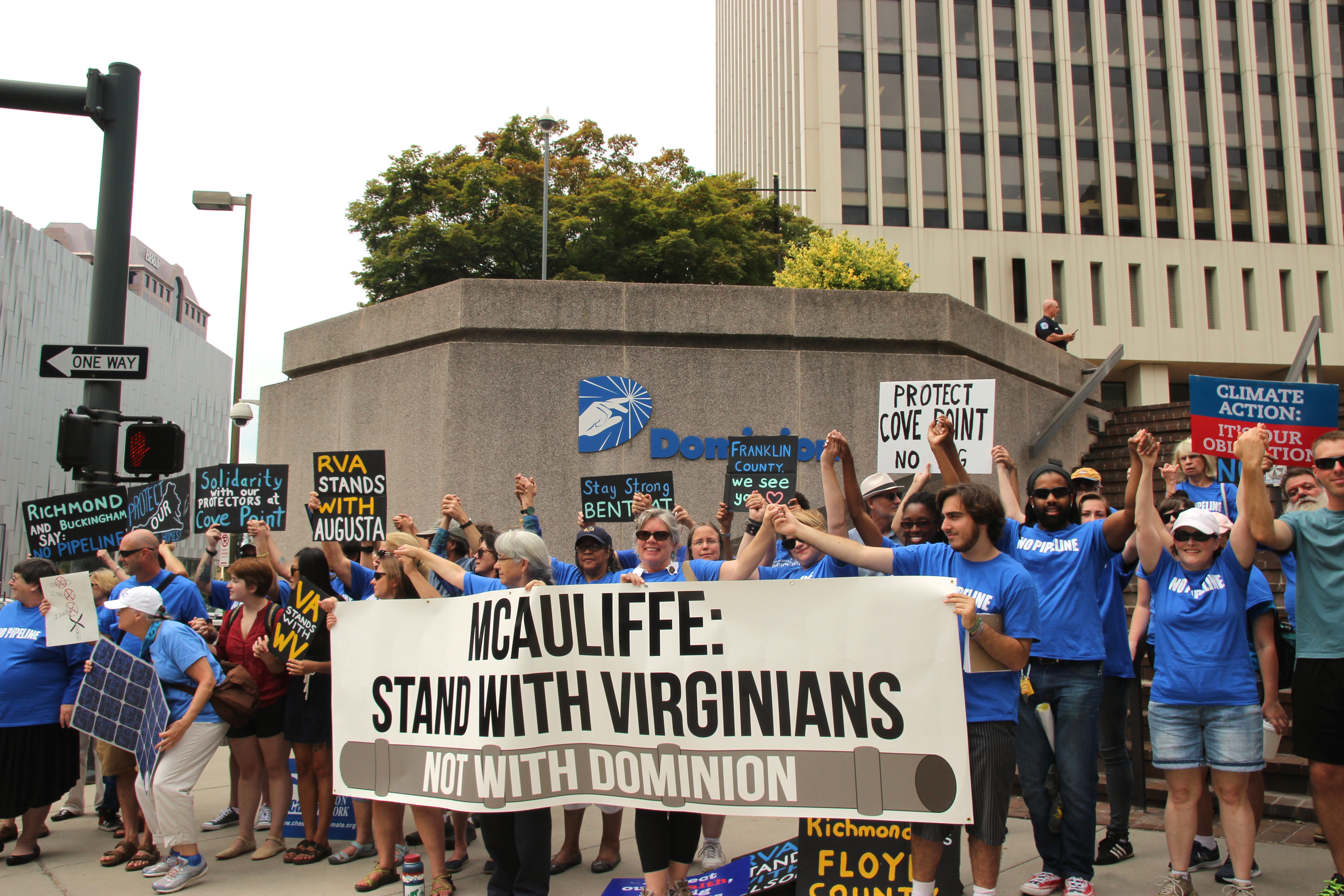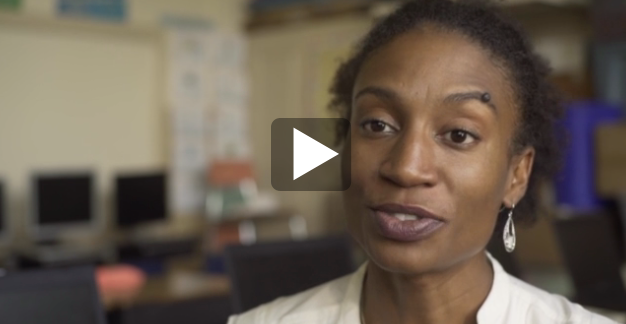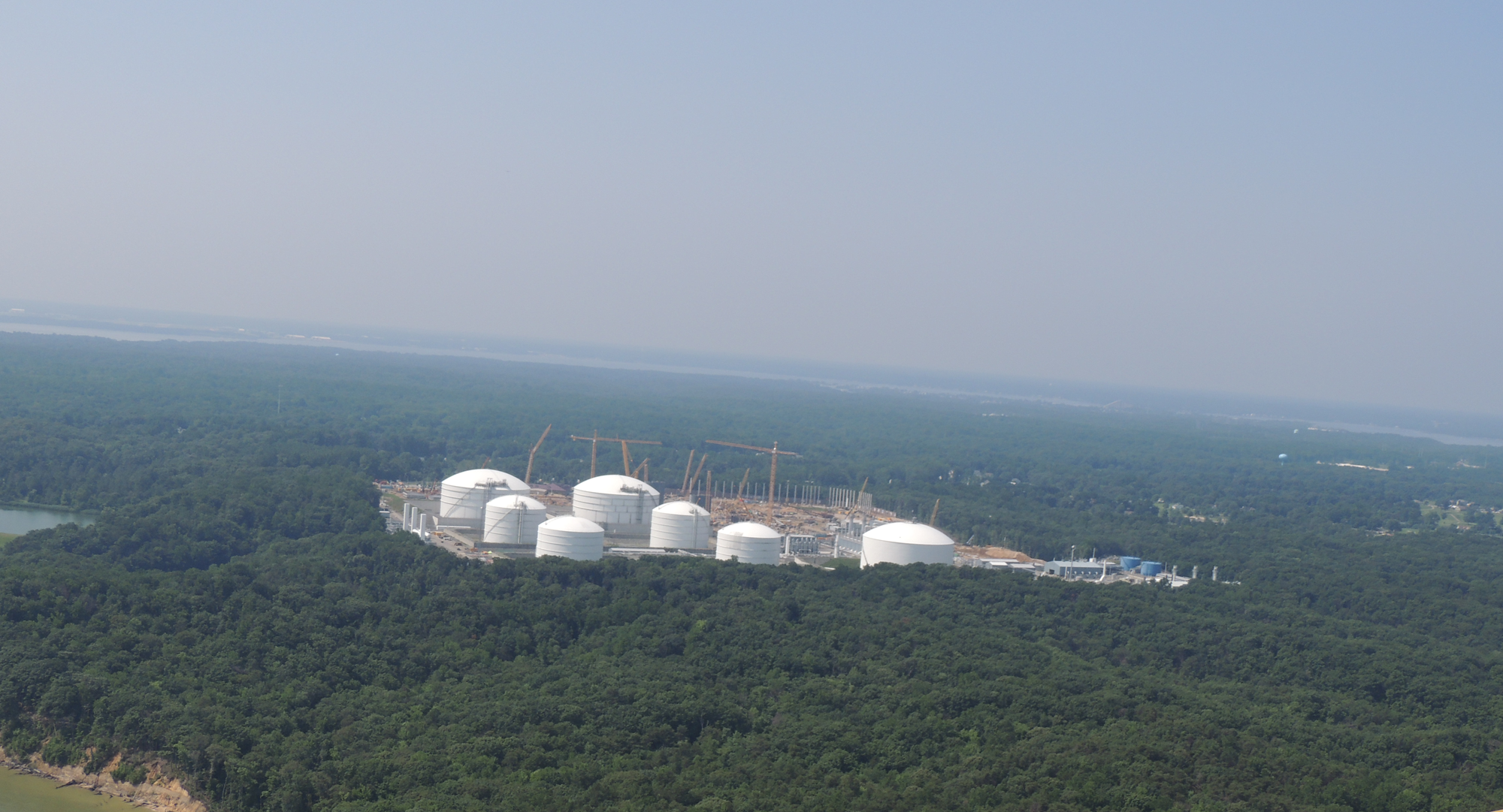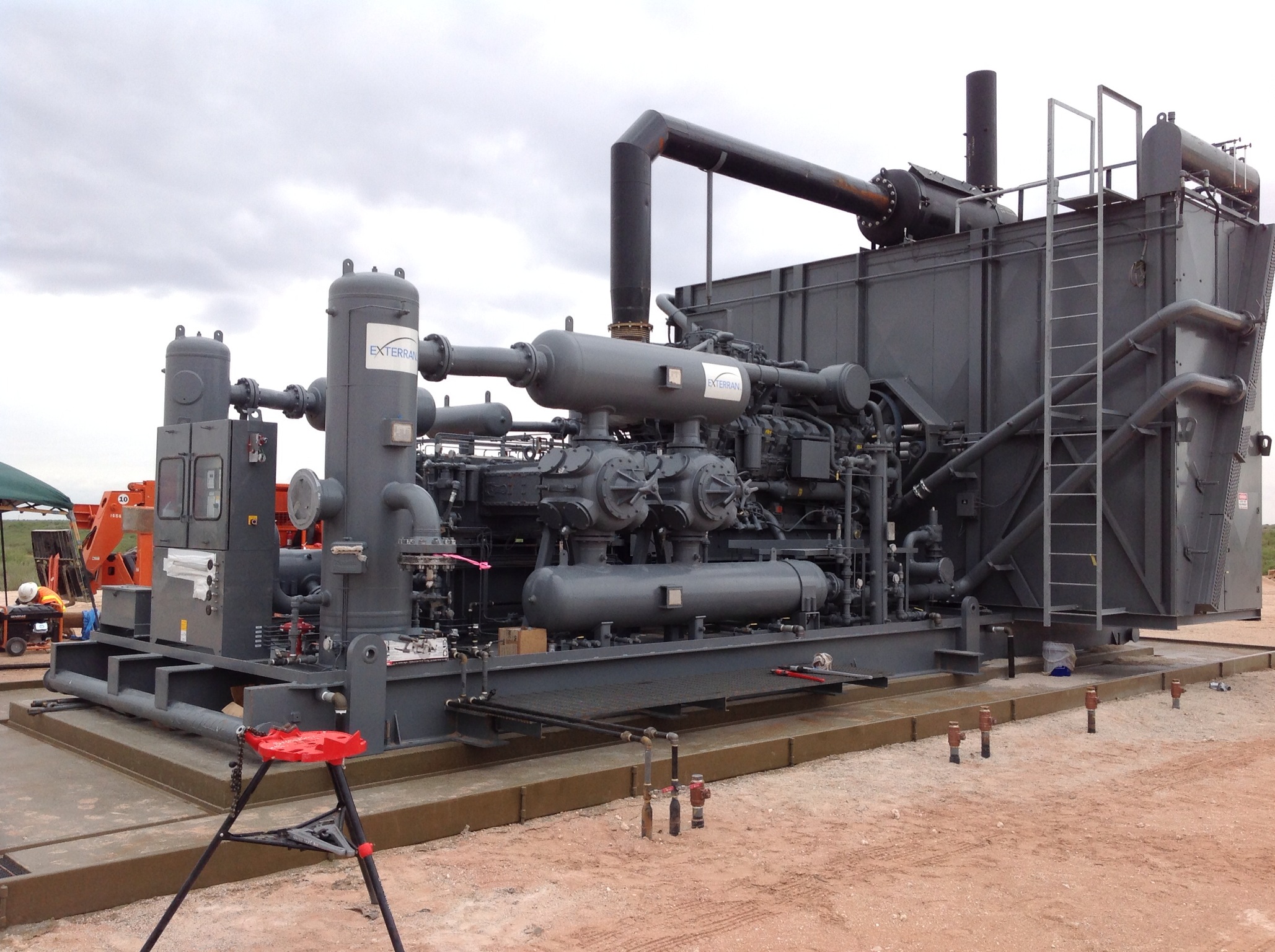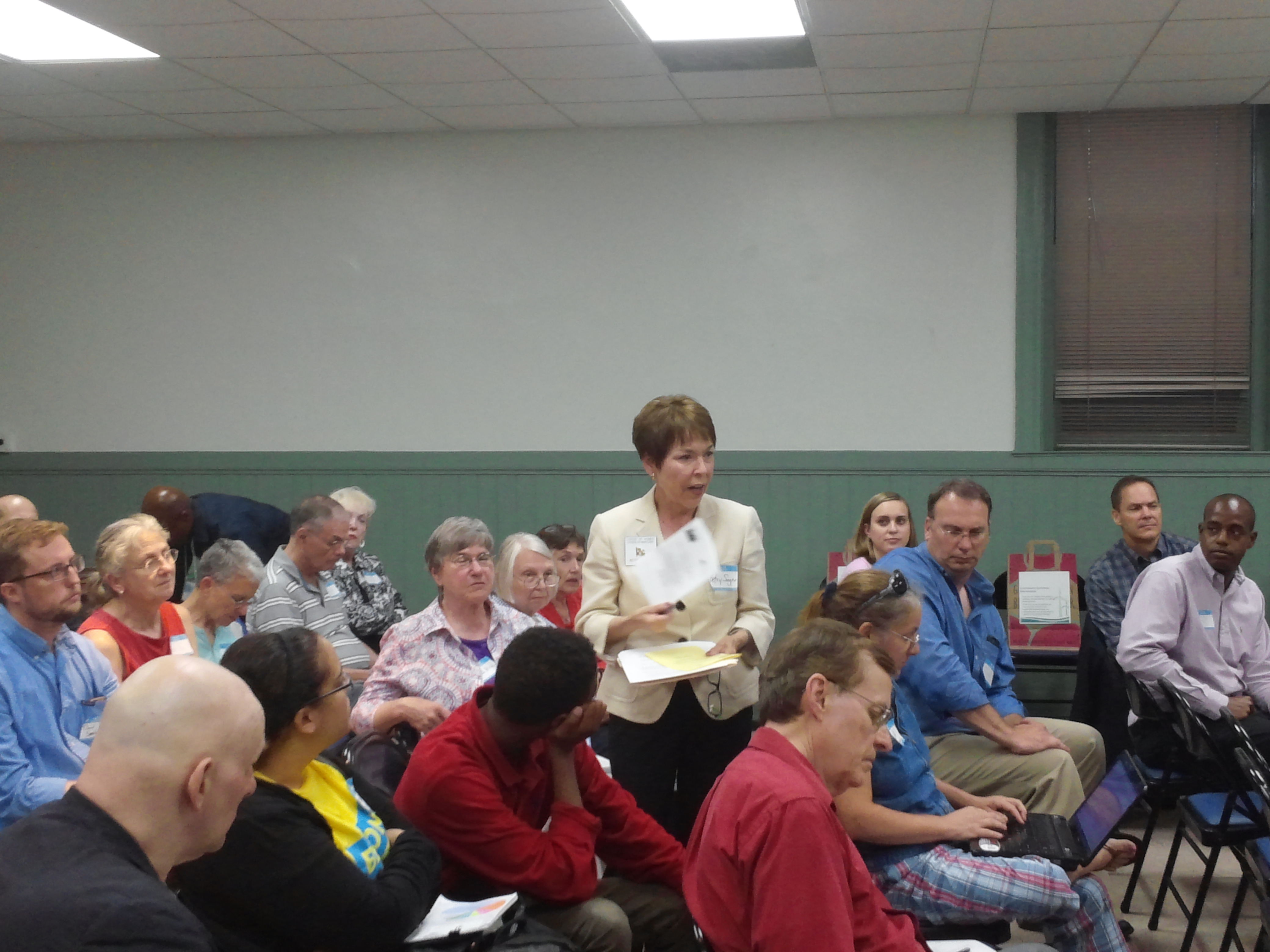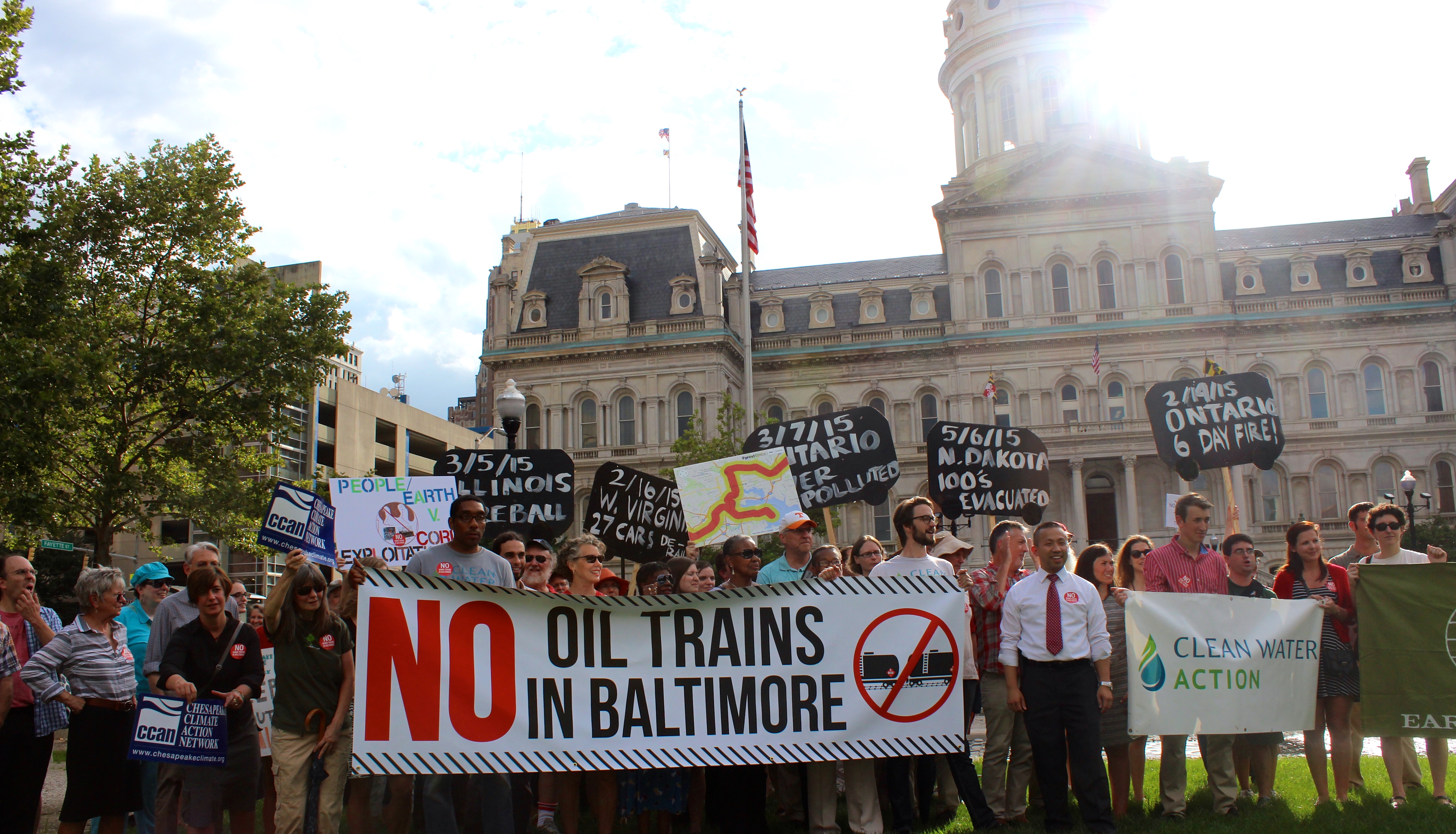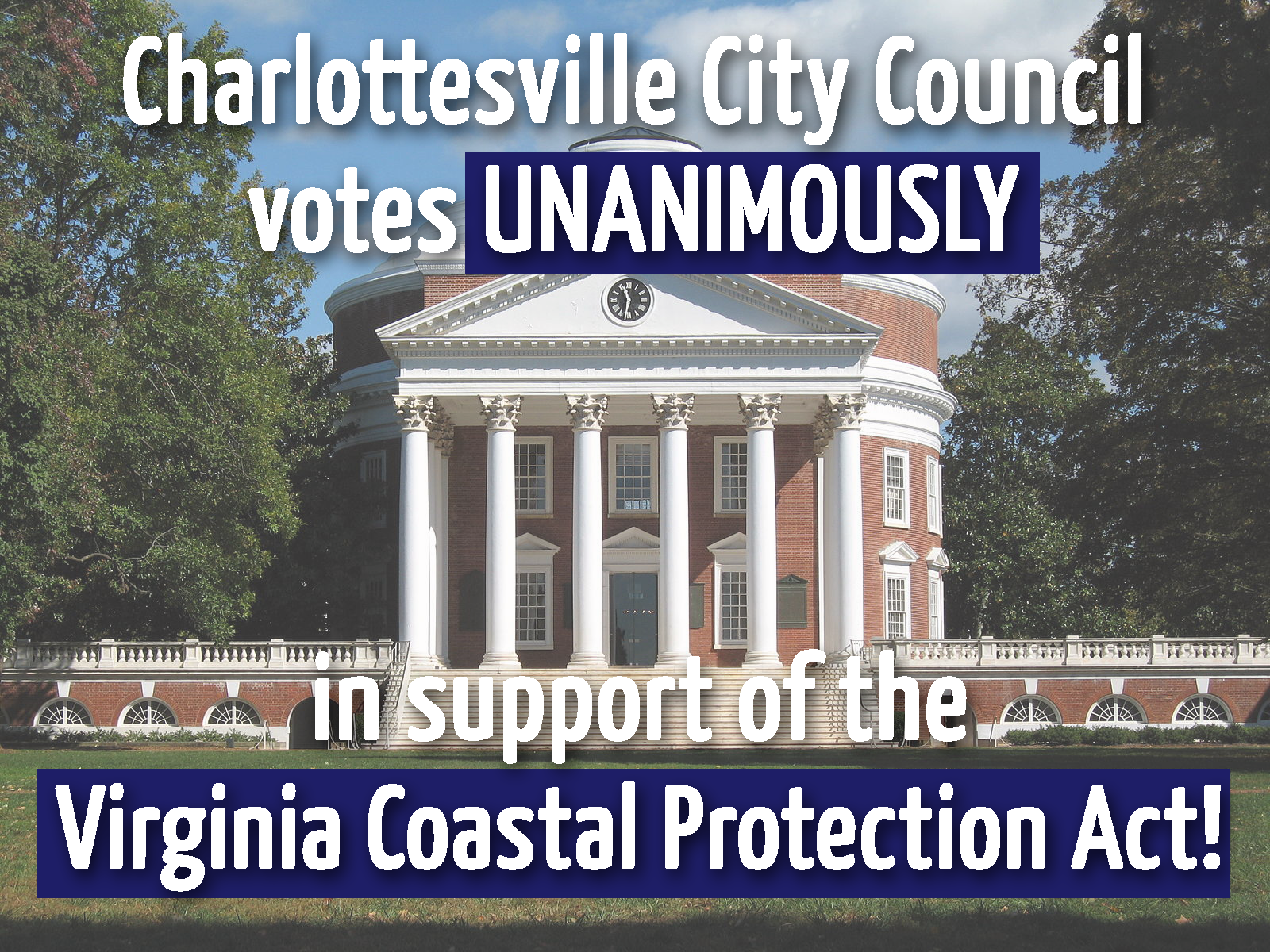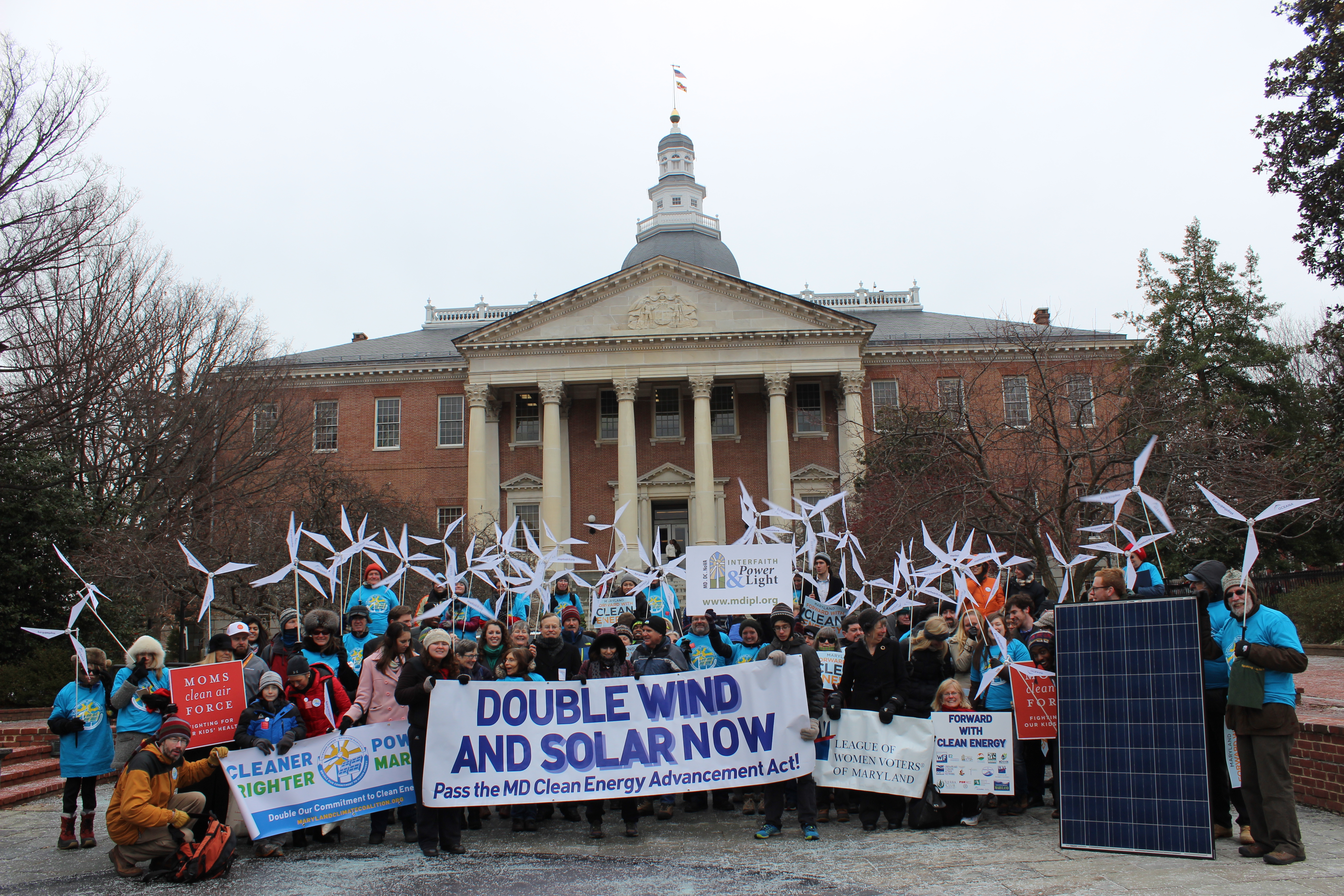This post was authored by CCAN’s new volunteer Richmond Pipeline Coordinator, Chelsea Norman.
“Stand With Virginians, not with Dominion” — that’s what echoed through the streets of downtown Richmond on Tuesday as CCAN and our allies participated in the first Hands Across Our Land pipeline resistance march.
This August marks one year since the first informational meetings Dominion Power held in Augusta, Buckingham, and Nelson counties for their proposed Atlantic Coast Pipeline. It also marks one year of growing pipeline resistance across Virginia.
I started as a volunteer with CCAN a week ago, and the dedication to protecting Virginia’s climate from shortsighted fossil fuel projects like these is abundantly clear. Made up of landowners and their allies, business owners, faith leaders, students, lifelong climate activists, artists, and concerned citizens, a community has been born that is resisting new natural gas infrastructure right in the heart of Dominion-ruled Virginia.
Three proposed pipelines: Atlantic Coast Pipeline, Mountain Valley Pipeline, and the lesser known Atlantic Connector — together these spell disaster for our lands, our coast, and our climate. That’s why over fifty people came out to join hands Tuesday and urge Governor McAuliffe to withdraw his support of these disastrous pipelines.
Two of the inspiring people that came out Tuesday were Will Barr and his mother-in-law Lisa Tulley, who are currently being sued by Dominion for denying the company approval to survey their land. Surveying seems like such a small act, but in reality it consists of a myriad of inspectors, large crews on the property and digging for about a week’s time.
“For me, in addition to the environmental effects, it’s about property law. It destroys the community, it’s dangerous and I can’t control what’s happening to my own property — something I’m supposed to be able to protect.” Barr and his wife own eight mountainside acres in Nelson County’s Horizon EcoVillage. The Atlantic Coast Pipeline will cut across their property, along with eleven other lots in the village and 40 acres of public land. According to Barr, spreading across these lots is a wetland that hosts a rare tree breed as well as an endangered species that Dominion’s environmental representatives plan on trapping,. Barr’s mother-in-law is particularly concerned about water: “It’s going to intersect five aquifers that serve our well system. My biggest concern is the quality of our drinking water. What happens if there’s a leak?”
Today’s event was one of 15 Hands Across Our Land events across Virginia – including one in nearly every county threatened by these proposed projects, and one of 30 nationwide. This coordinated day of action was conceived by organizers at the Blue Ridge Environmental Defense League and supported by dozens of Virginia groups. The Richmond event was coordinated by BREDL, CCAN, Virginia Sierra Club and the Virginia Student Environmental Coalition (in their first major action of the new school year).
https://twitter.com/BelEsprit92/status/633681476651982848/video/1
As a unified community we stood, hands clasped, banners waving, and urged Governor McAuliffe to withdraw his support of the Atlantic Coast Pipeline and Mountain Valley Pipeline. He has said before that there is nothing he can do about these pipelines, but that is far from true. He can stand with Virginians, not with Dominion and their allies. He can stand with the property owners whose land will be destroyed and whose property values will plummet, and the low-income communities whose health will be impacted by compressor stations and other dirty infrastructure projects
 James Freeman, a Richmond resident and Virginia mountain hiker was in the crowd today. In one hand he held a “Protect Our Virginia” sign and in the other he held the clearest symbol for Hands Across Our Lands – his eight-year-old son Dylan’s hand. “We must think of our future generations who will reap the repercussions of our decisions.”
James Freeman, a Richmond resident and Virginia mountain hiker was in the crowd today. In one hand he held a “Protect Our Virginia” sign and in the other he held the clearest symbol for Hands Across Our Lands – his eight-year-old son Dylan’s hand. “We must think of our future generations who will reap the repercussions of our decisions.”
What’s next? In September, we expect Dominion to file for the Certificate of Public Necessity and Convenience, i.e. their permit to start construction of the Atlantic Coast Pipeline. Virginians from Highland to Chesapeake are gearing up to respond, and so are we here at CCAN. Stay tuned for more.
Hampton Roads speak up! Share your climate change story with Flood of Voices
Today we, along with our partners at Virginia Organizing and Virginia Sierra Club, are inviting you to check out and join the “Flood of Voices,” a new website dedicated to the stories of coastal Virginians being impacted by rising tides and flooding, especially those whose voices are not normally heard.
See the stories your neighbors have contributed so far here.
Then, join the Flood of Voices by sharing your own! Click here to get started.
The Flood of Voices project began in March, when Virginia Organizing brought the South Hampton Roads community together for a series of events to share and collect stories of flooding in low-income neighborhoods.
Everyone has a story, from Tuere Brown (above) who was stranded on a washed out road trying to take students home from a flooded school, to Peggy Stamoulis, who put herself in the path of flood waters because she needed a job. These voices are important, and tell the story of daily life in Hampton Roads.
We know personal stories are the most effective way to inspire action and build a strong movement against climate change. CCAN, Virginia Organizing and Virginia Sierra Club are using these stories to educate and organize across Virginia and build the support we need to win solutions for our families — like passing the Virginia Coastal Protection Act. The stories of our neighbors in Hampton Roads play a huge role in influencing our legislators and show that climate change isn’t a crisis for our grandchildren, it’s a crisis for us right now.
On August 3, the Environmental Protection Agency released the final version of its Clean Power Plan. The Plan will reduce carbon emissions that are fueling climate change and sea level rise while increasing development of wind, solar and efficiency.
The EPA rules leave it up to Virginia to decide how to cut fossil fuel pollution. Over the past year, CCAN activists like you have been building momentum behind a win-win solution: Passing the Virginia Coastal Protection Act to join the nine-state Regional Greenhouse Gas Initiative, or RGGI. This bipartisan state legislation would cap carbon pollution in Virginia and raise up to $100 million annually to fund flooding protection measures in our hardest-hit neighborhoods.
In the U.S., the Hampton Roads region is second only to New Orleans as home to the most people at greatest risk from flooding caused by rising sea levels. Residents are already seeing the consequences – living on the front lines of climate impacts driven by fossil fuel industry pollution. Chronic flooding is forcing the raising of homes, roadways and naval infrastructure, and it’s only getting worse. Scientists predict that sea levels could rise by as much as seven feet within this century. In the event of a major storm, there is no effective plan to evacuate and shelter residents, even as warming ocean temperatures and longer hurricane seasons increase the risk of superstorms like Sandy.
We must act now to protect coastal Virginia from the impacts of climate change, and a “flood of voices” is rising up to demand change.
Everyone has a story to tell: how has flooding impacted your life? We want to know! Share your story with us by filling out this form and we’ll follow up with you.
From CCAN’s General Counsel: Update on Cove Point Legal Fight
While groups on the ground in Calvert County continue to stand up to Dominion’s massive liquefied natural gas (LNG) export terminal along the Chesapeake Bay, the fight is simultaneously moving forward in federal court.
On behalf of CCAN, Patuxent Riverkeeper, and Sierra Club, and their members who will be harmed by Dominion’s project, Earthjustice asked the United States Court of Appeals for the District of Columbia Circuit on May 7th, 2015 to review the Federal Energy Regulatory Commission’s (FERC) decision to approve Dominion’s LNG export project without a valid environmental review. Our lawsuit centers on FERC’s unlawfully narrow environmental review of Dominion’s massive project to convert its virtually idle LNG import facility into a hub for LNG exports. That review—criticized in over 150,000 citizen comments—omitted credible analysis of the project’s lifecycle global warming pollution, along with all the pollution associated with driving demand for upstream fracking and fracked gas infrastructure; its impact on water quality in the Chesapeake Bay and risk to the critically endangered North Atlantic Right Whale; and potentially catastrophic explosion and fire threat to hundreds of nearby residents.
Our legal fight to stop the $3.8 billion export facility began within FERC itself. CCAN members joined thousands of others in submitting comments to FERC on Dominion’s application and the agency’s environmental review of the project. After conducting the minimum review allowed under the National Environmental Policy Act (NEPA), FERC approved the proposal on September 29th, 2014. Concerned that the agency had not fully considered the many ways that Dominion’s LNG export project will impact the environment and threaten community health and safety, CCAN and its partners, with the help of Earthjustice, asked FERC to review its decision. FERC sat on our request for months—a process known as “tolling”—even as it approved order after order allowing Dominion to begin construction. After seven months, FERC finally denied our request. Once we completed FERC’s internal review process (or “exhausted our administrative remedies,” in legal jargon), we were finally able to challenge the agency’s decision in federal court.
Tragically, FERC’s foot-dragging allowed Dominion’s bulldozers to start construction before residents were able to appeal to the federal court. Citing the fact that Dominion’s construction activities have already begun to irrevocably damage the landscape and quality of life in Calvert County, Maryland, CCAN, Patuxent Riverkeeper, and Sierra Club asked the D.C. Circuit in June to halt all construction while our case was pending. Injunctions are difficult to obtain, and the court ultimately denied our request, but that decision has no bearing on the merits of our case.
Environmental groups are not the only ones who are challenging FERC’s decisions regarding Cove Point. Before Dominion proposed to expand and convert the terminal, Cove Point was a mostly dormant import facility. Energy companies, including BP, Statoil, and Shell had contracts to import natural gas to the terminal. Dominion granted Statoil the opportunity to relinquish its import capacity, but did not grant BP or any other importer the same opportunity. Signaling that the import market is uncertain, BP has asked the DC Circuit to review this denial, and BP’s case has been consolidated with ours.
We do not yet have a briefing schedule for the consolidated cases, but hope it will allow for argument in the court’s spring term. FERC has failed its important duty under NEPA to analyze and disclose the environmental consequences of allowing Dominion to build and run a facility that can export up to nearly 1 billion cubic feet of natural gas per day. FERC must stop cutting corners when it comes to our fragile climate and environment. Our lawsuit is a step towards pushing FERC in the right direction.
Residents of Buckingham Say NO to Proposed Compressor Station
This is a guest post from Virginia Atlantic Coast Pipeline Fellow, Nqobile Mthethwa, you can reach her at NqobileM@chesapeakeclimate.org.
Over 50 people gathered at the Frances Redwood Center on July 22nd to discuss the proposed Atlantic Coast Pipeline and Compressor Station in Buckingham County. The seminar was a joint effort by Friends of Buckingham, Chesapeake Climate Action Network and Yogaville Environmental Solutions. This seminar was presented to the annual session of the United Baptist Association of Central Virginia.
The presentation gave an overview of the proposed 550 mile and 42 inch Atlantic Coast pipeline and the rush for natural gas in the eastern region of the United States. Friends of Buckingham member Kenda Hanuman presented the dangers of compressor stations and what the proposed Buckingham station would mean for the community. Concerns ranging from toxic emissions, land rights, noise and light disturbances, and the creation of only 2 full time jobs from the station were all discussed.
Following the presentation, community members engaged by firing off questions about the proposed pipeline and compressor station. People were concerned how noise levels that accompany this type of infrastructure would affect sleep in this rural community. Many had pointed questions about the elderly people of Buckingham with compromised health issues including respiratory conditions. The elderly fear their lack of mobility could be detrimental in the event of leaks and explosions.

Many people had questions about the economics, specifically the outsourcing of jobs to out of state workers, the loss of land and depreciation of its value, and supposed tax benefits gained by the people of Buckingham being outweighed by health/environmental costs. Especially concerning was the difficulty of tapping into the gas to be used by Buckingham. Right now, if a county or business wanted to use gas from the pipeline, it would cost $5 – 8 million to ‘tap’ the line.
Citizens are troubled with the way Dominion is forcing their way onto private property by lawsuits against innocent citizens. Many people’s families have lived in Buckingham for hundreds of years. Dominion is willing to compromise the health and livelihood of Buckingham citizens for empty promises of cheap natural gas and economic benefits.
The general consensus among attendees was there is no benefit to Buckingham citizens or anyone else in the pipeline path, there are only costs to health, community and the environment. Further, they saw that natural gas isn’t a sustainable source of energy because the effects of climate change are predicted to get worse with the continued use of fossil fuels.
The more people learn about this project, the more people turn against the ACP. We see citizens of all faiths and regions in Virginia are standing together in opposition to the Atlantic Coast Pipeline and compressor station. Like the folks in Buckingham, people across Virginia have been and will continue to build coalitions to resist every point of the destructive proposed pipeline and compressor station. The Buckingham meeting has reaffirmed the belief that “Organized people will always win over organized money.”
Huge victory to keep ‘EmPOWERing’ Maryland
Last Thursday, the Maryland Public Service Commission (PSC) launched Maryland into the top tier of electricity-saving states by embracing one of the highest energy efficiency targets in the country. The order requires that Maryland’s electric utilities achieve annual incremental electricity savings of 2.0% of retail sales per year in perpetuity. The long-awaited decision, which CCAN’s policy experts pushed to make as strong as possible, gives a huge boost to the state’s “EmPOWER Maryland” program, which helps consumers save money while fighting climate change.
This is a big step forward with exciting promise — the new EmPOWER rules will require utilities to save over 1.2 million megawatt-hours per year. That’s the energy equivalent of closing a 460 megawatt coal-fired plant every two years, and will reduce carbon at levels equivalent to taking 173,000 cars off the road annually. To put that another way, the new EmPOWER rules will reduce carbon emissions at the same rate as building 470 megawatts of new wind power every year. That’s nearly three times greater than Maryland’s installed wind capacity today.
To put Maryland’s new goals into a national perspective, only two other states—Rhode Island and Massachusetts—achieved saving levels higher than 2% last year. In terms of future targets, Maryland’s new goals are among the top five in the country.
CCAN’s director, Mike Tidwell, was out in front of news coverage on the PSC decision, driving home its impact on WAMU and in the Baltimore Sun.
“The state of Maryland has just taken a huge step in showing that action on air pollution and climate change can go hand in hand with consumer savings,” said Tidwell, “The PSC deserves praise for hearing the public’s voice that efficiency is a win-win. We now hope other states will follow suit at this same high level.”
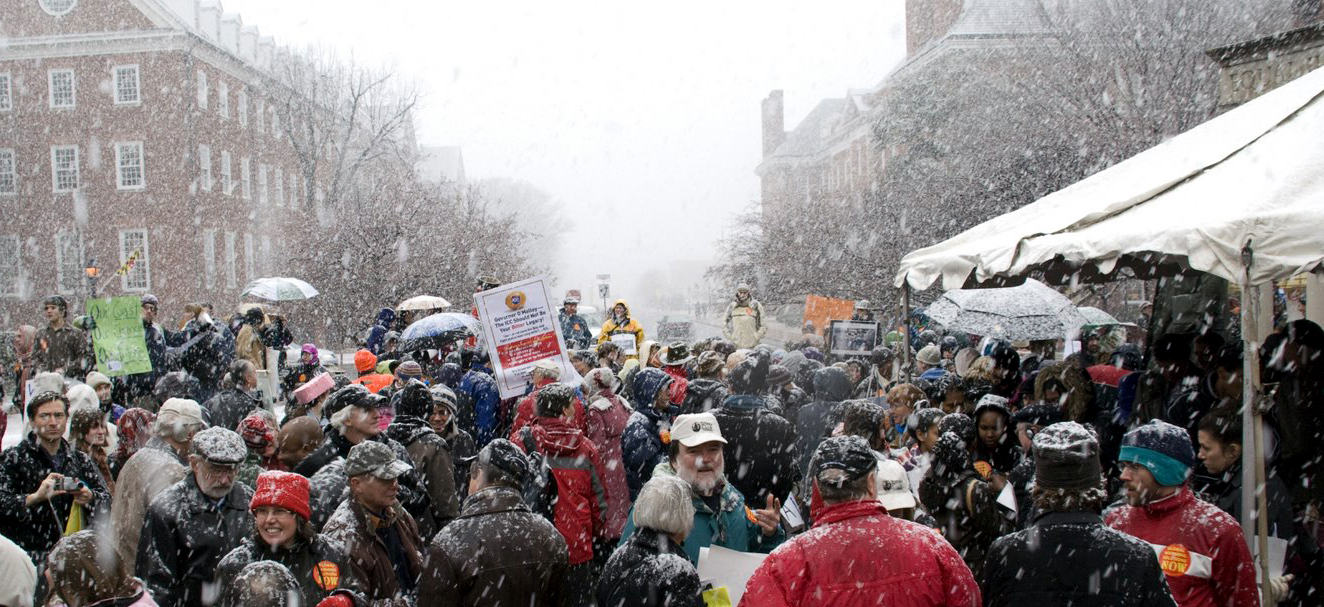
In 2008, CCAN activists helped drive the campaign to pass the EmPOWER Maryland Energy Efficiency Act. That law, which set the goal of reducing energy use by 15% below 2007 levels by 2015, enabled consumer rebates and other incentives to invest in energy-saving measures. The PSC’s decision to expand and strengthen the EmPOWER program will ensure we continue making progress beyond 2015. This decision was three years in the making, and CCAN was an official intervenor in the PSC process, pushing for the strongest programs and goals every step of the way.
Looking ahead, the new EmPOWER rule will play a key role in meeting Maryland’s commitment to reduce global warming pollution by 25% by 2020 under the Greenhouse Gas Reduction Act. The state’s new efficiency commitment will help achieve Maryland’s Climate Action Plan. CCAN will be focused in the coming year on making sure we renew and strengthen other core elements of that plan — like continuing to increase our reliance on clean electricity sources like wind and solar.
RGGI Helps You Keep More $$$ In Your Pockets
Amazing things happen when states support the expansion of energy efficiency programs: electricity bills decline, fossil fuel pollution decreases, and the public at-large benefits. These were among the many conclusions of a highly anticipated report released last week by Analysis Group. The report studied the recorded costs and benefits of the Regional Greenhouse Gas Initiative (RGGI) from 2012 through 2014 to the nine northeast states that voluntarily participate.
RGGI is a cooperative effort that caps and reduces carbon emissions from power plants. Power plants in participating states (from Maine to Maryland) purchase allowances for every ton of carbon pollution that they emit. RGGI states agree on how many pollution allowances to offer for sale each year, setting a declining cap, and the revenue from the sale of allowances is returned to individual states. (For a background explanation of RGGI, see this CCAN fact-sheet.)
In short, the report states that directing resources to energy efficiency programs “stands out as the most economically beneficial use of RGGI dollars.”
These findings are important, particularly due to the report’s timing. In a matter of weeks the Environmental Protection Agency is expected to finalize the rules of the Clean Power Plan which will require Virginia to cut its carbon pollution by over one-third within the next fifteen years. RGGI is a solution to the Clean Power Plan and could provide Virginians with numerous other benefits as well.
Analysis Group Report: In Detail
One very important detail: This new Analysis Group report focuses solely on the economic costs and benefits of RGGI. The report acknowledges that RGGI was originally formed for the expressed purpose of reducing fossil fuel pollution to combat climate change. RGGI certainly has benefits to the environment, public health, and other areas that the researchers don’t consider as a part of the scope of this study. Analysis Group measured only the impacts of RGGI on the economy in the nine participating states.
On Energy Efficiency
RGGI states’ successful usage of energy efficiency investments paved the way towards $460 million in total electricity bill reductions for consumers in the past three years, while lowering carbon pollution faster than these states expected. The report concedes that there are many other ways states benefited by participating in RGGI, which includes both direct and indirect costs throughout the region. On the whole, Analysis Group found that the enormous benefits to consumers via energy efficiency resources created through RGGI dramatically outweighed the costs of participation in the program.
Specifically, the report found the following:
“RGGI-funded expenditures on energy efficiency depress regional electrical demand, power prices, and consumer payments for electricity. This benefits all consumers through downward pressure on wholesale prices, even as it particularly benefits those consumers that actually take advantage of such programs, implement energy efficiency measures, and lower both their overall energy use and monthly bills. These savings stay in the pockets of electricity users directly.”
In short, RGGI-supported energy efficiency dollars save consumers money. According to the latest data from the U.S. Energy Information Administration (EIA), the average residential customer’s electricity bills in the nine RGGI states is $108.43. That figure is nearly $17 lower than the average monthly residential electricity bill Virginians pay of $125.36. The national average is $111.08.
Why do customers in RGGI states pay lower electricity bills than customers in Virginia? The answer is simple: customers in RGGI states use a lot less electricity. Again referencing the latest EIA data, the average residential user’s energy consumption in RGGI states is 702 kilowatt hours (kWh) per month, far below Virginia’s average consumption in the residential sector of 1,156 kWh monthly. The national average is 909 kWh monthly.
Statewide energy efficiency programs like lighting and appliance upgrades, home insulation inspections and improvements, and general consumer efficiency education all help customers consume less electricity, which ultimately reduces customers’ bills and decreases fossil fuel generation and pollution. Customer bills in RGGI states are lower than the national average even though electricity rates in RGGI states are indeed higher than the national average. The important factor is electricity consumption, and it’s a fact that RGGI leads to less energy consumption and consumers in RGGI states use less electricity than Virginians.
Critics of RGGI and the Clean Power Plan argue that they’re too costly. However, independent studies and documented government data strongly suggest the opposite. If done correctly, Virginia can craft its plan of compliance in a way that is extremely cost-effective and actually lowers bills for consumers. RGGI is the smartest path forward for Virginia.
Other RGGI Benefits
Even though Analysis Group concludes that energy efficiency provided the most “bang for your buck” and produced the most direct economic value to consumers, the report points out that states have been increasingly more creative in the use of RGGI dollars to advance various state priorities.
“The states’ use of allowance proceeds not only provide economic benefits, but also has helped them meet a wide variety of social, fiscal and environmental policy goals, such as addressing state and municipal budget challenges, assisting low-income customers, achieving advanced energy policy goals, and restoring wetlands, among other things.”
Sea level rise from climate change is threatening our coast. Electricity bills in Virginia are among the nation’s highest. The EPA is requiring states to reduce their carbon footprint for the public’s health and welfare. It’s time for bold, yet practical solutions in Virginia to meet these challenges.
We can begin solving all of these problems by joining RGGI and wisely reinvesting our allowance resources in adaptation, energy efficiency, and other statewide priorities. The evidence is here. The program works. Now we need the wisdom and resolve to join our neighbors by becoming the 10th state participating in RGGI.
Packed Room at Baltimore Kickoff for Statewide Climate Hearings
Cheryl Arney held up a picture of her granddaughter in a crowded room in the Patterson Park Library in Baltimore City. As she held up the photo of a young smiling girl she stated, “I am here because of her — this is her century and we must protect the Earth for her.” Cheryl was one of 21 people who testified in front of the Maryland Climate Commission.
The Maryland Climate Commission — a stakeholder group of government, industry, and nonprofits including Chesapeake Climate Action Network — are working to get public input on Maryland’s Climate Action Plan.
The Baltimore City meeting which took place on Tuesday, July 14th was the first in a series of public forums to be held on climate change. More than twenty activists and concerned citizens said they want to see more aggressive action to reduce greenhouse gas emissions and increase usage of clean, efficient energy in Maryland.
On November 15th, the commission will release a report to the General Assembly with recommendations about next steps for climate action in Maryland, and the purpose of these listening sessions is to help inform that report.
CCAN and our allies have been encouraging activists to attend these sessions, and this kickoff event was a great success! Leaders from the faith community, environmental groups, labor organizations, low-income advocates, and several concerned citizens packed the room and delivered a clear message to the commission. They said they want the state to stay on course to achieve the science-based carbon cuts required by the Maryland Greenhouse Gas Reduction Act of 2009. That law needs to be renewed in 2016 by the General Assembly. Many of those present said lawmakers should not only renew but also strengthen the landmark law.
Several activists also referred to the state’s clean electricity standard (the Renewable Portfolio Standard or RPS), saying it should be increased to at least a 25% by 2020 standard. With the RPS too, many activists urged the commission to consider going even beyond 25% by 2020. Many activists also addressed the importance of statewide energy efficiency measures, again encouraging decision makers to strengthen existing goals.
There are several other Commission hearings planned across the state:
- Frostburg – UMCES Appalachian Laboratory – 7/28, 6pm
- Avenue – All Saints Episcopal Parish Hall – 8/4, 6pm
- Largo – PG County Department of Environment Resources – 8/6, 6pm
Baltimoreans come out to say ‘Stop Oil Trains’ at city’s first public hearing
On Wednesday, over 70 concerned Maryland residents rallied in front of Baltimore City Hall before the City Council’s first public hearing about the dangers of crude oil trains travelling through the city.
Our rally joined the North American “Stop Oil Trains” week of action, uniting communities across the U.S. and Canada fighting to protect people’s safety and our climate from extreme oil.
As the rally kicked off at 5:30 p.m. in 90-degree heat, a sea of red shirts and stickers converged on the green lawn across from City Hall. Rally-goers assembled a replica “oil train” marked with the dates and sites of accidents that have occurred across North America in 2015 alone — in West Virginia, North Dakota, Illinois, and Ontario. A last-minute sign repair pulled my attention away from the beginning rally. By the time I looked up, the amount of red had doubled.
The rally-goers listened intently as each speaker expressed his or her concerns about oil trains rolling through Baltimore. This week marked the two-year anniversary of the worst oil train disaster in North America, in Lac-Mégantic, Quebec, which killed 47 people.
“It’s clear that a crude oil train derailment in densely populated areas like Baltimore City could lead to a disastrous loss of life and property,” said Delegate Clarence Lam, MD, MPH (District 12—Howard and Baltimore Counties), who spoke at the rally and testified before the City Council.
“Oil trains don’t have to explode to be dangerous,” said Trisha Sheehan, Regional Field Director at Moms Clean Air Force. “They leak toxic chemicals, endangering everyone’s lungs, especially those most vulnerable to air pollution—our children.”
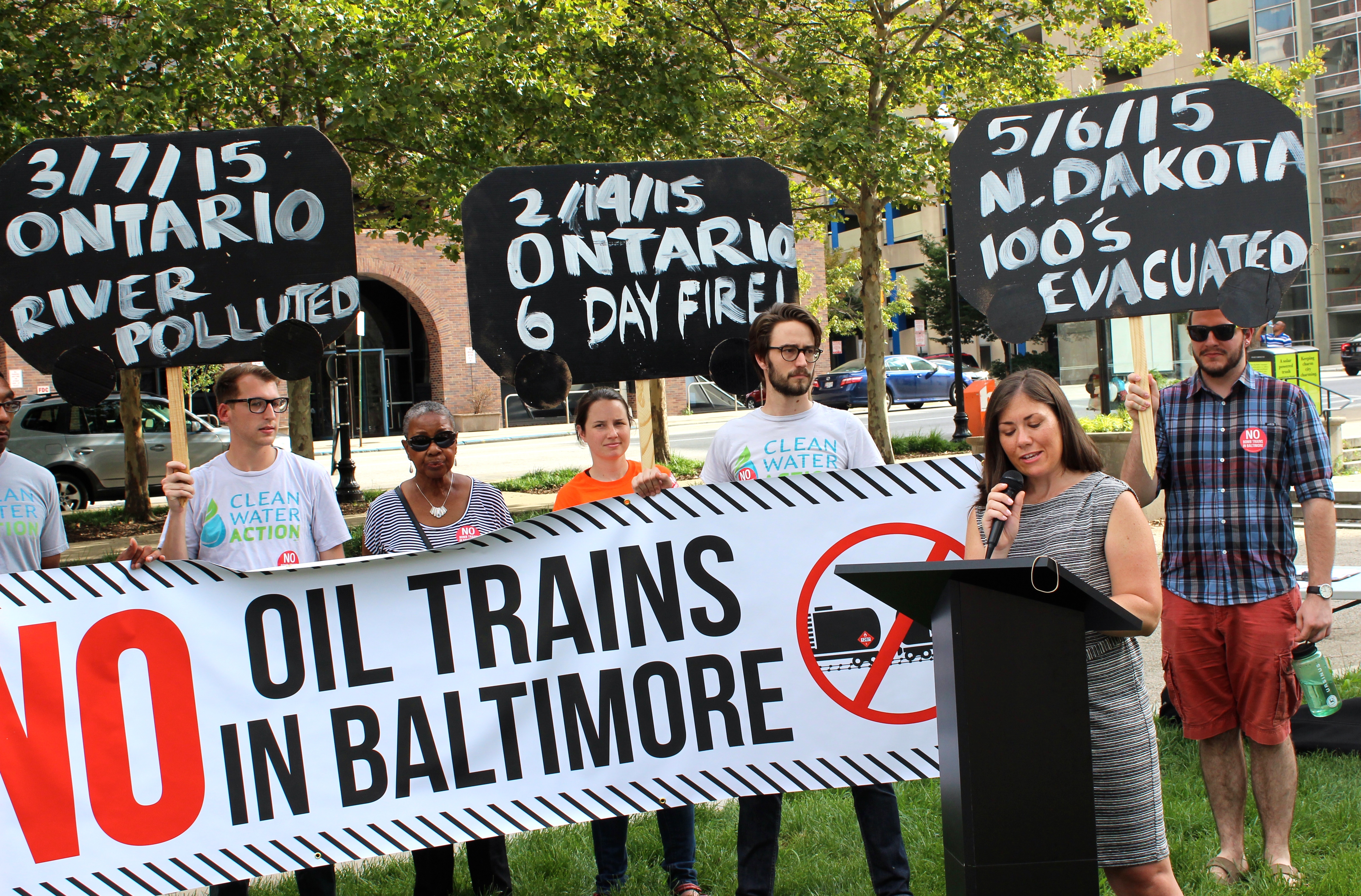
Mike Tidwell, director of CCAN, wrapped up the rally with a fiery speech. “Baltimore is in the blast zone,” he exclaimed. “City Hall is in the potential blast zone!”
The “blast zone” is the one-mile radius around railroad tracks that could be impacted by an oil train derailment and fire. In all, ForestEthics calculates that this zone includes 165,000 Baltimore residents.
The rally closed with Mike starting some chants and leading the crowd into City Hall. As I waited in a line to get into City Hall, I asked a fellow rally-goer what brought him out: “Once you know about an issue as threatening as crude oil by rail it’s hard to not stand up and do something,” said Cullen Simon.
This was the first hearing on oil trains City Councilmembers had held, and our crowd filled the seats with red “No Bomb Trains in Baltimore” stickers.
Speakers called on city and state leaders to act now to protect local rail communities. Specifically, the City Council should place a moratorium on approving permits for crude oil shipping terminals until local emergency management, health and safety officials study the associated dangers.
Presenters included Delegate Lam, Dr. Ana Rule, an air pollution researcher from Johns Hopkins University, Fred Millar, a rail safety expert, and Jon Kenney, Maryland Community Organizer at CCAN.
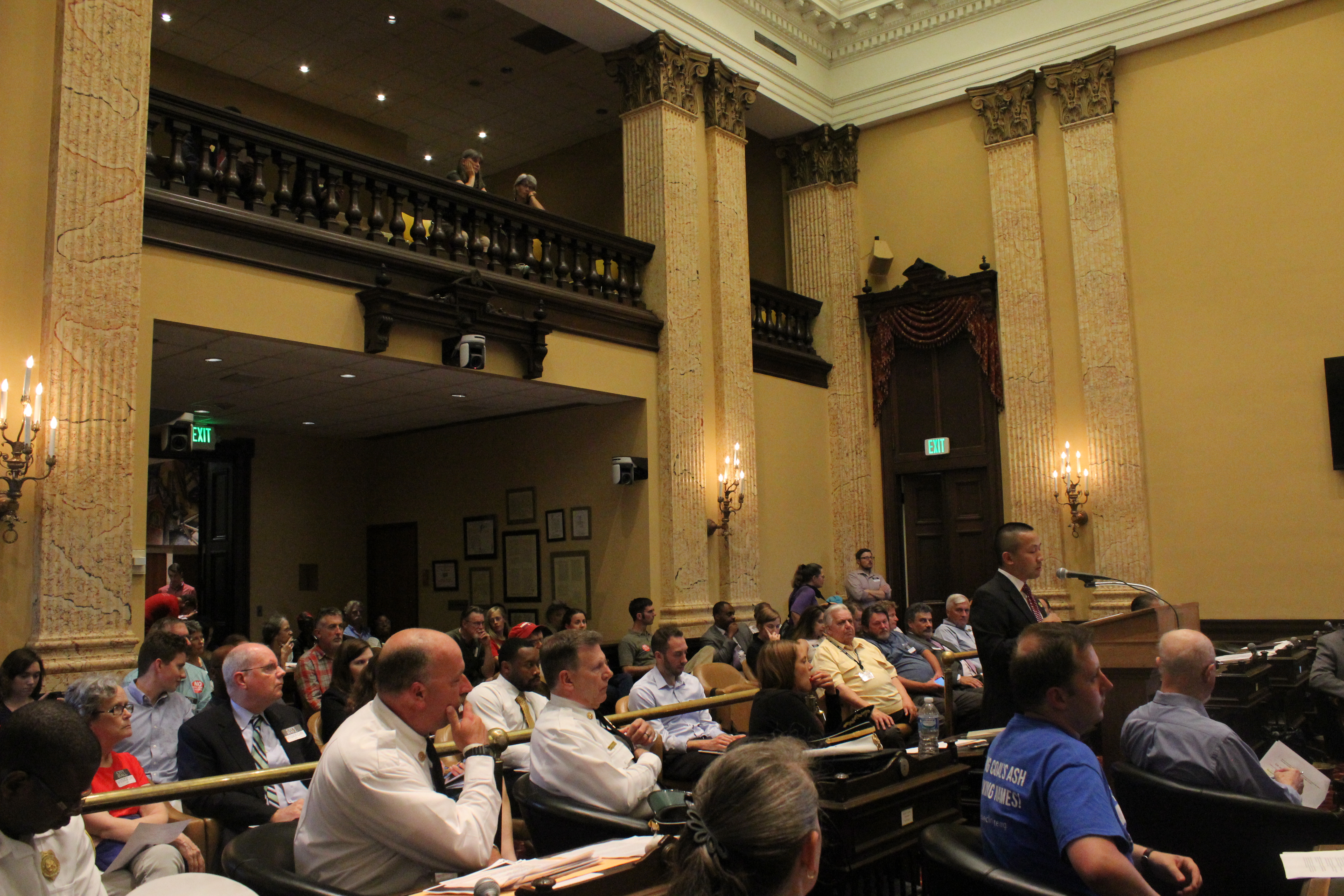
The presenters urged the City Council to place a moratorium on permits for crude oil shipping terminals as a step to prevent vulnerable city neighborhoods from becoming a gateway for even more of this dangerous cargo.
While federal regulations govern the movement of oil on railways, city officials have the power to regulate terminals where the oil is unloaded to be shipped on barges to East Coast refineries. The Baltimore Sun has reported that over 100 million gallons of highly volatile, toxic and climate-polluting oil has been shipped out of Baltimore over the previous two years — up from zero gallons the two years before.
The rally and hearing coincided with over 80 events planned across North America during the week of July 6th to draw attention to the growing threat oil trains pose to our health, safety, and climate. Organizers of the week of action are demanding a federal ban on dangerous oil trains.
Thanks to everyone who turned out in Baltimore, we made a big impact in getting this issue on the radar of city officials and important media outlets. The Baltimore Sun, WYPR radio, and the Baltimore Brew all ran stories on the protest and hearing, which will help educate more residents about this growing problem.
As the national week of action closes on Sunday July 12th, CCAN and supporters will continue to press forward to pass a moratorium on crude oil shipping terminal permits in Baltimore.
Charlottesville City Council Endorses Major Step Forward on Climate in Virginia
The July 4th weekend ended with a bang on Monday night when the Charlottesville City Council unanimously passed a resolution urging Virginia’s legislature to clamp down on climate pollution.
The resolution calls on Virginia to join the nine-state Regional Greenhouse Gas Initiative (RGGI). This program would make Virginia’s biggest polluters pay for the carbon they emit and send the money back to our state. We’re not talking chump change: RGGI is projected to generate $200 million annually for Virginia by 2020 to invest in clean energy and energy efficiency projects statewide, and to prepare Virginia’s vulnerable coast for rising seas. You can learn more about this policy solution on our Safe Coast campaign page.
With the Council’s 5-0 vote, Charlottesville became the second city after Norfolk to pass a resolution urging our General Assembly to act on this climate solution. Across the state, CCAN is urging city councils to pass resolutions in favor of Virginia joining RGGI. It’s a key part of our plan to build momentum in the lead up to next year’s legislative session.
We’ve got momentum behind us. In the 2015 General Assembly, CCAN worked with Del. Ron Villanueva (R-Virginia Beach) and Sen. Donald McEachin (D-Richmond) to introduce a bipartisan bill — called the Virginia Coastal Protection Act — that would have made Virginia the first southern state to join this successful pollution-cutting program. We came within one vote of passing the bill out of a key Senate committee, and saw an outpouring of support from Virginians across the state.
Building on this victory in Charlottesville, CCAN will push forward with supporters in other cities and counties across Virginia to pass resolutions. Email Statewide Organizer Charlie Spatz at charlie@chesapeakeclimate.org to get involved with a local campaign, or start your own!
Help Keep Maryland on Track to Tackle Climate Change
With the release of Pope Francis’s sweeping climate change encyclical, quickly followed by the U.S. Environmental Protection Agency’s comprehensive report on the stunning economic costs of runaway global warming, the national spotlight is on climate change now more than ever. Here in Maryland, we are poised to make some momentous decisions related to climate action this year. Which of course means that we all have our work cut out for us!
First, we will need to make sure Maryland stays committed to achieving science-based reductions in statewide greenhouse gas emissions. In the next General Assembly session in Annapolis, we will need to pass legislation renewing the Greenhouse Gas Reduction Act, which expires at the end of 2016. First passed in 2009 – thanks in large part to CCAN activists like you – this landmark law requires that we slash statewide carbon emissions by at least 25% below 2006 levels by the year 2020. Renewing this law is of tremendous importance for climate-vulnerable Maryland, as explained in this recent Baltimore Sun letter to the editor by CCAN fellow Jamie DeMarco. In order to achieve those reductions, this law also required the creation of Maryland’s Climate Action Plan, which was released in 2013.
At the same time, we have to ensure Maryland actually achieves those science-based reductions, and that means we need to make serious headway towards a clean energy economy. That’s why one of the most important pieces of the Climate Action Plan is ramping up Maryland’s clean electricity standard. Looking ahead to 2020, we’re currently on track to get about 18% of our power from renewable sources like wind and solar energy. In the 2016 legislative session, we will want to accelerate that increase to a full 25% clean electricity standard by 2020, and put ourselves on track to double our commitment to 40% by 2025.
So how are we going to both renew Maryland’s premier carbon cap law and also take the steps necessary to achieve it? By engaging Marylanders across the state to get involved, make their voices heard, and demand that legislators and agency officials do right by our climate. There will be several ways to do that this summer:
- Participate in the Maryland Climate Commission Listening Sessions The Maryland Climate Commission, in which CCAN is heavily involved, is a broad stakeholder group charged with making recommendations about next steps for climate action in Maryland. This summer is your opportunity to tell this commission that you want to see Maryland continue to be a climate leader! It’s also your opportunity to further shape Maryland’s Climate Action Plan. This commission will be hosting listening sessions across the state to update residents on the progress the state has made towards greenhouse gas reductions, as well as to hear from local communities about ways that we can continue to address climate change in Maryland.
- Put your faith into action by joining Climate in the Pulpits/On the Bimah/In the Minbar! Following the Pope’s DC visit, CCAN and our partners at Interfaith Power & Light will be asking faith communities across Maryland to answer Pope Francis’ call to address climate change. Dozens of faith leaders and their communities will be dedicating their worship services to creation care the weekend of September 25-27th.
- Sign up to be part of CCAN’s advocacy committee! Throughout the region we are looking for passionate, dedicated volunteers who can help influence their legislators to act. You’ll receive the training and the tools you need to convince your leaders in Annapolis that in 2016, Maryland should renew its premier carbon cap law and takes the steps necessary to achieve that law, staving off the worst impacts of climate change and building a clean energy economy in our state.
No doubt about it, we have our work cut out for us this year. But the need to act has never been so great, and the opportunity to build a new, clean and healthy future for Maryland has never been so great!

